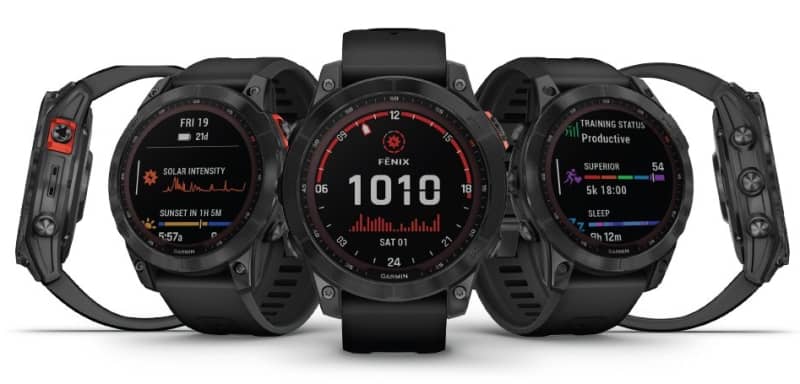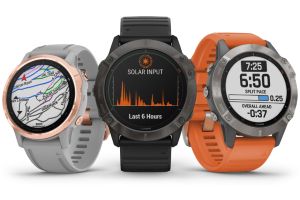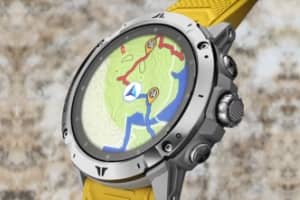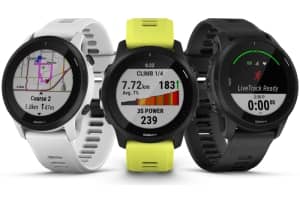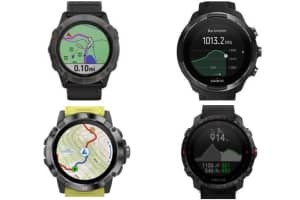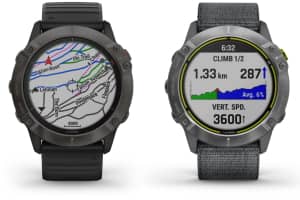Buy Garmin Fenix 7
Buy Garmin Epix
Commercial links. Prices are not contractual. Please visit the merchant site.
The Fenix series is the brand's flagship, high-end sports watch for outdoor and performance use. The Fenix 7 has all the features of the Fenix 6, but with the addition of a touchscreen, a sleek design, a huge battery life, a next-generation optical sensor and a host of new, practical features that are particularly useful for sportspeople. The series has also been simplified to make it easier for users to find their way around. The Fenix 6 series was very complex, with à la carte features such as mapping, music player and optional WiFi. It was difficult to find your way around the different models offered by Garmin (over 20 models!).
The Epix (or Generation 2 Epix) is a new model that has nothing to do with the first generation released in 2015, the first Garmin watch to offer an offline map. It has all the features of the Fenix 7 but with a AMOLED screen. It is only offered in one case size and in standard or Sapphire (but not solar) versions. The battery life is a little shorter but still excellent. It is intended for more urban use, a kind of smartwach but with full sports functions.
Introduction of the Fenix 7
A new touch screen
One of the main novelties of the Fenix 7 is its touch screen, a feature previously reserved for the brand's connected watches (Vivoactive and Venu series). Garmin understood that this feature was of interest to many users, particularly for handling topographical maps, but the American giant needed to master the technology, particularly with the complexity of the Solar models, to offer it on its top-of-the-range model.
The Fenix 7's screen is smooth and responsive, even in the rain or when wearing gloves, which sets it apart from many touchscreen watches. Maps can be zoomed in simply by tapping the screen twice, which is very convenient.
For sportsmen who do not wish to use the touch screen, the function can be deactivated by a shortcut key. The buttons can be used to control all functions, as on the previous model. It is also possible to choose to activate the touch screen only for certain sports profiles, such as hiking.
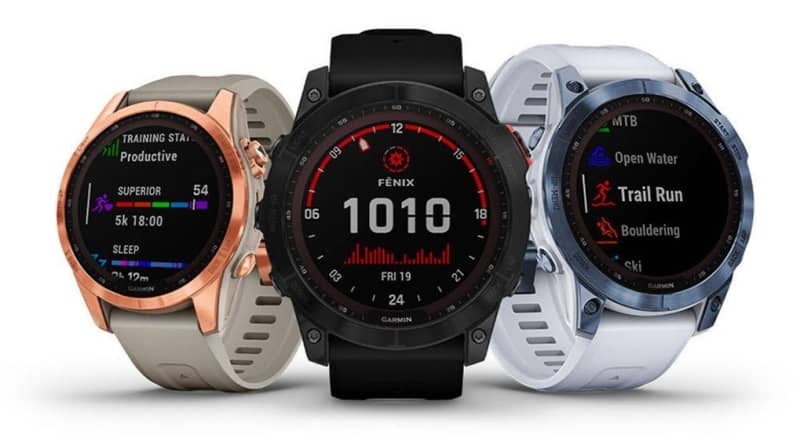
A simplified model with a refined design. Maps, MP3 player and Wifi generalised to all models.
Like the previous model, the Fenix 7 comes in three case sizes (42mm, 47mm and 51mm) and an unchanged screen resolution of 240 x 240 px, 260 x 260 px and 280 x 280 px respectively. This means that it fits all wrist sizes. The screen size does not vary (30, 33 and 35 mm respectively) despite a larger surface reserved for the solar sensor (it is the bezel that has been refined to save space without affecting the screen size).

But Garmin is simplifying the range by offering the same features on all models. For example, maps, MP3 player and WiFi, which were optional on the 6 series, are now available on all three Fenix 7S, Fenix 7 and Fenix 7X models.
The big change concerns the quality of the glass: DX Corning Gorilla for the standard model, Power Glass (DX Corning Gorilla with solar charging) for the Solar model and Power Sapphire (ultra-resistant sapphire glass and solar charging) for the Sapphire model. So, in addition to the 3 case sizes, Garmin offers 3 variations of its watch:
- Standard model: DX Corning Gorilla glass, steel bezel, 16GB memory
- Solar model: Power Glass (DX Corning Gorilla and solar charging), steel bezel, 16GB memory, multi-GNSS
- Sapphire Solar model: Power Sapphire (sapphire crystal and solar charging), titanium bezel, 32Gb memory, multi-GNSS and dual frequency GPS
We summarise the different models in a summary table below.

In terms of design, the bezel has been lengthened so that it can be fixed to the lugs of the watch, either by gluing (Fenix7S) for a look more suited to women, or by screws (Fenix 7 and Fenix 7X). Garmin also says it has solidified the whole thing with metal to make it more robust.
On the solar recharging models, the bezel is slimmed down to give more space to the photovoltaic collector (54% more surface area, see below).
| Version: | Standard | Solar | Sapphire Solar |
|---|---|---|---|
| Solar charging | - | • | • |
| Glass | Corning Gorilla DX | Power Glass | Sapphir Solar or Power Sapphir |
| Bezel | Steel | Steel | Titanium |
| Memory | 16 GB | 16 GB | 32 GB |
| Models | 7S, 7 | 7S Solar, 7 Solar, 7X Solar | 7S Sapphire, 7 Sapphire, 7X Sapphire |
| Sizes (mm) | 42, 47 | 42, 47, 51 | 42, 47, 51 |
| Screen size (px) | 240x240 | 260x260 | 280x280 |
| Screen size | 30 mm | 33 mm | 35 mm |
| Touch screen | • | • | • |
| Maps | • | • | • |
| MP3 player | • | • | • |
| Garmin Pay | • | • | • |
| Multi GNSS | • | • | |
| Dual frequency GPS | • | ||
| Flashlight | • | ||
| Battery life in GPS mode | 40h to 62h | 51h to 135h | 51h to 135h |
| Waterproofing | 100m | 100m | 100m |
An autonomy1.5 to 2 times greater than that of the Fenix 6
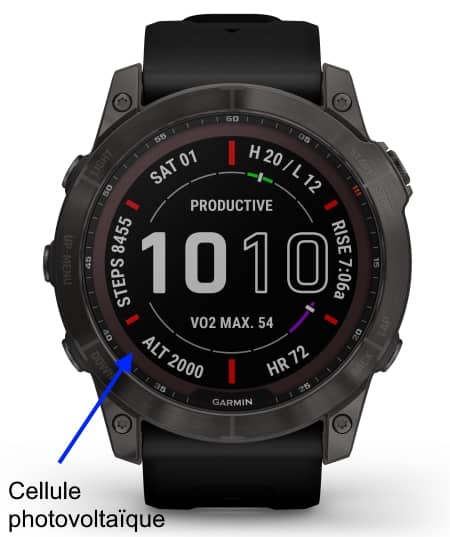
The Fenix 7's autonomy has made a great leap forward with a gain of 50% compared to the previous model and almost 100% with solar charging, provided the watch is exposed to at least 3 hours of sunlight at 50,000 lux. With 135 hours of autonomy in GPS mode, the Fenix 7X rivals the very recent Coros Vertix 2 and its 140 hours of autonomy.
This notable gain in solar autonomy (3 to 6 times greater than on the Fenix 6) was achieved by increasing the surface area of the photovoltaic sensor by 54%. To achieve this feat without changing the size of the screen, Garmin had to trim the bezel of the watch (photo above). Thus, instead of 3 to 6 hours of additional autonomy on the Fenix 6, the Fenix 7 offers 11 to 39 hours more!
| GPS Mode | Fenix 7S (+ Solar) | Fenix 7 (+Solar) | Fenix 7X (+ Solar) |
|---|---|---|---|
| Connected watch | 11 days (+3) | 18 days (+4) | 28 days (+9) |
| GPS mode | 40h (+11) | 62 h (+21) | 96 h (+39) |
| Multi GNSS | 28h (+4) | 42h (+11) | 66h (+17) |
| Dual frequency | 16h (+1) | 24h (+2) | 38h (+4) |
New sensors including dual-frequency GPS
On the sensor side, the Fenix 7 has a new optical heart rate sensor and an oximeter (4th generation) that we hope will be even more accurate than the previous one.

Also new, but only available on the Solar and Sapphire models, the GPS becomes multi-GNSS, i.e. capable of connecting simultaneously to several satellite systems at the same time (GPS, GLONASS, Galileo, QZSS, IRNSS), improving the time of connection and above all the quality of reception in places where the signal is poor.
But that's not all, the Sapphire model also benefits from a dual-frequency GPS system using the L1/G1 and L5/G5 bands of the GPS and Galileo systems. This system, found on the Coros Vertix 2, allows the correction of errors linked to the reverberation of signals (mountains, forests, rocks) and thus improves the precision of GPS. Read our explanations on multi-frequency GPS.
New features
On the functionality side, Garmin's offer is extended with several very practical and useful tools. We find all the functions of the Fenix 6 (read here our detailed review) with the following new features:
First of all, the sports profiles, already numerous (about thirty), are completed. In particular, there are profiles for several water sports (surfing, wind surfing, kite surfing) with dedicated metrics such as wave height, the nearest spots, and information on the wind. Garmin also adds a HIIT profile.

The Stamina feature, exclusive to Garmin and more sophisticated than the one offered on the Coros Vertix 2, should appeal to many sportsmen. It provides information on the level of endurance in real time. It displays, in the form of a gauge, the energy available during the activity and is updated as the race progresses, according to the efforts made. It gives an indication of how many kilometres you can run before you run out of energy!

Up-ahead gives a better visibility of the completed course by summarizing, on a single screen, performance metrics, intermediate times, distance and altitude but also useful information previously defined during the programming of the course: distance to the next refueling point, distance to the finish, next difficult turn, distance to the next viewpoint, etc.
For runners, the Fenix 7 now displays both running and walking times in its statistics.

A new Trend Race Predictor feature, an enhanced version of the Race Predictor feature, takes into account past performance over 8 weeks to display estimated race times in real time (time is re-evaluated en route).
The altitude acclimatization function has been improved. Fenix now displays an easy to use graph for high altitude ascents.
Garmin improves the health tracking, taking up the novelties of the Venu 2 and Vivoactive 4 models, with notably a complete health check (heart rate, breathing rate, heart rate variability, stress level) through a 2 minute test. Sleep monitoring is completed by a sleep score (as Fitbit already does).

The mapping, available on all models, is pre-loaded on the Sapphire model. The Sapphire model has 32Gb of memory to store maps from around the world. On the other models, you have to choose and download the maps for free from the Garmin website. It should be noted that Garmin offers ski maps (pistes) for more than 2,000 resorts around the world on its watch. The Fenix 7 now offers cross-country ski trails in addition to downhill trails. The GPS navigation is completed by an audio guidance (you need bluetooth earphones to benefit from the function).
However, this new model does not offer an ECG, a 4G/LTE chip (features that Garmin considers to be of little use on a watch designed for outdoor and performance use), or a microphone and speaker. There is also no native power sensor on the wrist, as with Polar or Coros.
A torch on the 7X model

Garmin proposes an attractive innovation, in particular for trail runners who run at night: a torch to see and be seen, a little on the model of Smartphones. It is integrated into the Fenix 7X (the big model) and consists of 3 LEDs that can be programmed (white or red colour, intensity, continuous or flashing mode). The watch can also generate an SOS message. A special mode allows the watch to be switched on in sync with the race pace: white light when the arm is at the front, red light when it is at the back.
Setting up the watch from Garmin Connect
Another notable improvement is that the watch can be fully configured from Garmin Connect. All the programming functions available on the watch are also available from Connect: data fields, profile customisation, widget settings, watchface, etc. Synchronisation is done in both directions, from the watch to the application (when a parameter is changed from the watch) and vice versa. It is therefore easy to program the watch from the application (Smartphone or PC) or to save the settings if the watch is reset.
Presentation of Epix
The Epix is a new Garmin model with all the sensors and features of the Fenix 7 but with a beautiful AMOLED screen. The AMOLED screen (read our explanation) offers several million colours and a high quality display. It can be found on smartphones and connected watches such as the Garmin Venu, Apple Watch and Samsung Galaxy Watch.
Garmin's idea here is to offer a watch that is as complete as the Fenix 7 but more urban, to be worn on a daily basis.
The Epix is available in only one case size (47mm, the equivalent of the Fenix 7, the middle size) with a 454 x 454 px touchscreen and a steel bezel. It comes in 2 models, with Corning Gorilla glass or sapphire glass but not solar. Its autonomy is a little weaker but still excellent: up to 42 hours in GPS mode and 16 days in connected watch.

Our opinion. How to choose between the Fenix 7 and Epix models.
Our opinion
The Fenix 7 and Epix are high-end watches for outdoor and performance sports enthusiasts. They are perfect for hiking, trail running, skiing (downhill, cross-country, ski touring), water sports, triathlon and many other outdoor sports. Their sleek design also makes them suitable for everyday wear in the city and at work. The Epix, with its beautiful AMOLED display, is more intended for urban use, much like a connected watch.
These new models seduced us for the quality of the materials, the new functions Stamina, Trend Race Predictor, Up-ahead, the programming of the watch from Garmin Connect.
Multi-GNSS (available on the Fenix 7 Sapphire and Solar) and multi-frequency GPS (available on the Fenix 7 Sapphire) should also significantly improve the accuracy of GPS tracking, especially in the forest and in the city. However, this mode consumes 3 times more battery power and will be less interesting for ultra long rides.
It's a pity that Garmin still doesn't integrate native power on the wrist for power measurement in running, as Polar and Coros already offer. This would be a welcome feature for power-based running training.
Which Fenix 7 to choose? Fenix 7 or Epix, which one to choose?
Choosing the Fenix 7 is fairly straightforward. The Fenix 7S is best suited to slim wrists, the 7 for medium wrists and the 7X for medium to large wrists. The Fenix 7X is very bulky and will not be comfortable for someone with thin wrists. That said, it has the advantage of carrying a torch, and offers the longest battery life.
Then you have to choose the model: standard, Solar or Sapphire Solar. This will depend on the intended use and the desired autonomy, but also on the budget! The bigger the model, the greater the autonomy. The Solar model, which is more expensive, offers a real battery surplus (unlike the Fenix 6 Solar model), provided that the watch can be exposed to the sun during the outing. The Sapphire model, even more expensive, offers an ultra-resistant glass, therefore more robust, but a little more matt. The Corning Gorilla is very resistant but more sensitive to scratches than the sapphire.
Between Fenix 7 and Epix, how to make the right choice? Both watches offer the same sensors and the same functionalities. The difference is in the size of the case (47 mm, the size of the Fenix mid-range model) and the display. The display quality of the Epix is far superior to that of the Fenix. The Fenix only offers 64 colours. This means that there is not much variety in the shades, but this is enough for sports use. The AMOLED offers millions of shades, which makes it possible to display high quality images and photos. However, the Epix has a slightly shorter battery life and a significantly higher purchase price.
| Model | Why choose it | Drawbacks |
|---|---|---|
| Fenix 7 | Ideal for sports Suitable for all wrist sizes Huge autonomy, especially with solar charging Torch on the 7X model | Screen limited to 64 colors |
| Epix | Superb AMOLED screen (great animation, mapping) thanks to millions of colors More intended for urban use | Only one size of case Lower autonomy (42 h) No solar model High price |
Price and availability
The Fenix 7 and Epix are available to buy from Garmin and our partners. The Fenix 7 starts at €699, which is the same price as the Fenix 6 Pro (with mapping and MP3 player) or €100 more than the standard Fenix 6 (without mapping and MP3 player).
| Model | Standard | Solar | Sapphire Solar |
|---|---|---|---|
| Fenix 7S (42 mm) | 699 € | 799 € | 899 € |
| Fenix 7 (47 mm) | 699 € | 799 € | 899 € |
| Fenix 7X (51 mm) | - | 899 € | 999 € |
The Epix starts at €899.
| Model | Standard | Sapphire |
|---|---|---|
| Epix (47 mm) | 899 € | 999 € |
Buy Garmin Fenix 7
Buy Garmin Epix
Commercial links. Prices are not contractual. Please visit the merchant site.
These articles may also interest you
Coros Vertix 2 : la meilleure montre outdoor ?
Garmin Forerunner 945 LTE : la montre sportive avec connectivité 4G !
Comparison Garmin Fenix 6 vs Enduro: differences, which one to choose?
Meilleures montres GPS altimètre 2026 pour la randonnée
Photo credit : Adobe Stock. This article contains commercial links.

